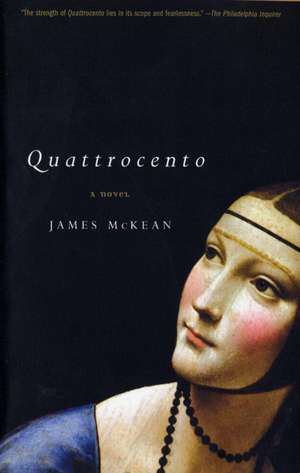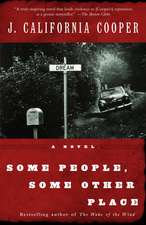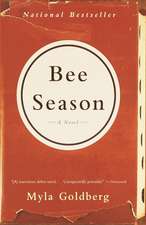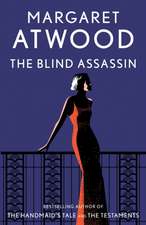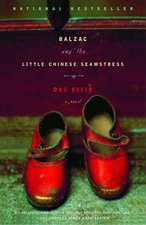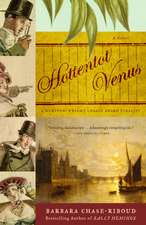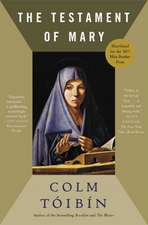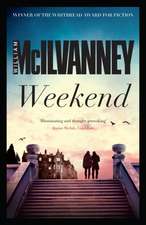Quattrocento
Autor James McKeanen Limba Engleză Paperback – 31 oct 2003
A magically woven, richly detailed debut, Quattrocento tells an unforgettable tale of art, and love, and the unexpected places places where they meet.
Preț: 101.99 lei
Nou
Puncte Express: 153
Preț estimativ în valută:
19.52€ • 20.30$ • 16.11£
19.52€ • 20.30$ • 16.11£
Carte disponibilă
Livrare economică 25 martie-08 aprilie
Preluare comenzi: 021 569.72.76
Specificații
ISBN-13: 9780385721301
ISBN-10: 0385721307
Pagini: 310
Dimensiuni: 134 x 205 x 19 mm
Greutate: 0.24 kg
Editura: Anchor Books
ISBN-10: 0385721307
Pagini: 310
Dimensiuni: 134 x 205 x 19 mm
Greutate: 0.24 kg
Editura: Anchor Books
Notă biografică
James McKean has been a violinmaker in New York for more than twenty years. His instruments have won numerous awards and can be heard on concert stages around the world. A recent cello was on view at the American Craft Museum as part of a landmark exhibit on craftwork at the millennium. He is also a contributing editor to Strings magazine, where his articles appear regularly. He lives in Connecticut with his family.
Extras
chapter 1
Blue. Darker than the sky, as deep as the sea, a blue so rich Matt could almost taste it on the breeze that rippled across the field of asters. Shading his eyes from the hot Umbrian sun, he watched the manticore lope down the field and leap into the sky with a stroke of its powerful wings. A harsh cry and it was gone, circling away over the trees, while below the faint silvery call of trumpets sounded amidst the high tenor yelp of dogs on the hunt. How could he have forgotten?
It was cool under the trees, the air fragrant with the scent of hemlock and mountain laurel. Led on by the neighing of horses and shouts echoing out of sight ahead, Matt forced his way through the underbrush, thick leaves and branches breaking against him like waves, sweat running down his back and into his eyes. It's not too late, he thought. Gone before they were seen, the sinuous outlines of hounds slipped through the shadows, followed by the figure of a man, a flash of red and yellow with a tall black stave in his hands, and then another.
Matt's horse followed, tossing her head as he urged her on, twisting and turning through the underbrush. Bursting into a clearing his mount reared and Matt was drifting through the dappled air, sword sailing from his hand as the trees spiraled around him, their crowns sparkling with sunlight far away. The ground slammed into him, hard under the thin layer of leaves, knocking the wind out of him, sliding away from his hands as he scrabbled to find a purchase, the dirt cold on his cheek.
"Orlando," he gasped, chest burning. The boy, he had to find the boy. He forced himself to his knees, and then with a groan to his feet, staggering as the trees circled him like hawks in the sky, his arm throbbing as though it would burst. His blue doublet crusted with dirt and dead leaves, one knee shining whitely through a jagged tear in his hose, he searched the ground around him for his sword. Orlando, his sword, it was all wrong. A trunk moved, detaching itself from the rest that stood in a silent rank around the glade. Black armor, gigantic, gleamed dully like water under the moonlight, the cuirass emblazoned with a double eagle and another eagle, bronze, nodding from the helmet, wings raised and beak opened in midcry. A sword, flat and broad, rose in its gloved hands, as the figure advanced toward Matt across the glade.
Holding his arm, Matt swayed as he tried to keep his balance. The blade drew closer and closer, settling at last on his chest. The sharp point probed, digging through the linen of his doublet and then his shirt, thin and wet with sweat, finding the soft hollow under his sternum, pushing him back step by step until the broad trunk of a tree stopped him. Turning up, the tip of the blade lifted him onto his toes, pressing him back against the unyielding tree.
"You don't belong here," a voice, disembodied, came from behind the burnished visor, the slit for the eyes an empty black gash. Another point of steel was next to Matt's eye, the blade of the knife cold against his skin, flattening his cheek. "Do you?" the man whispered. "Do you?" he shouted, and began to laugh, louder and louder, as the sword against Matt's chest dropped away and a massive hand, gloved in leather and chain mail, jammed around his throat, slamming his head back against the rough bark of the tree and lifting him higher and higher until he floated, the soft light of the clearing darkening and turning red and then black, exploding with pinwheels of vibrant color as the laugh rang through him, changing into a single note, discordant and harsh, resonating from deep within, crushing him with its power, the wolf tone--
chapter 2
"Poplar?" Sally asked, turning the small painting over so that she could see the wood panel of the back. She stroked the surface, as smooth as old ivory and almost black with age, the raised grain like the carved veins of a marble statue under her fingertips.
"Lombardy poplar," Matt replied.
"Oh. Lombardy poplar. That makes all the difference in the world."
"Well, it does," Matt said with a faint smile. "Go ahead and laugh."
A harsh tattoo of rain pelted against the window, the storm gaining as the late-November day faded into evening. Water streamed down the glass, dissolving the shadows from the light that, pearl-like, barely reached the back of the cluttered office. "Well, I just don't see it," Sally said, examining the darkened painting. "I can barely make out that it's supposed to be a face. There's something decidedly creepy going on here," she added with a frown. "It makes me think of Ophelia. Floating in the weeds, forgotten by Hamlet. You think you can bring her back to life?"
"I think it's worth a try."
"You're being awfully noncommittal," she said, giving him a sharp glance. "I know you. You're on to something, aren't you? What is this? A lost Leonardo?"
"Dream on. The odds are better than even that I'll never be able to put a name to it." He ran his hand through his hair, pushing it away from his forehead but it fell back again. He couldn't blame her, he thought, for he was just the same. Even though he knew arriving at who painted a picture should be the last step in a very long journey, it was impossible not to start thinking of it right away. Like walking down the street. A person in the crowd catches your eye; is it something singular about the face, or is it someone you know? For him, as an associate curator of Italian paintings at the Metropolitan Museum, it was also a professional reflex, and after five years he had to force himself to look for its own sake.
"Seems like a lot of work," Sally commented. "How long will it take you?"
Matt shrugged. "Hard to say. It depends on what's been put on it over the years. But it's not that big. It shouldn't take me more than a hundred hours. A hundred fifty, at the outside. Maybe two, if some clever restorer way back when came up with some varnish I've never seen before."
"Two hundred hours! Is it worth it?"
"I don't know. I never thought of it that way before."
"You're too much." Sally laughed. "How else would you look at it?"
"I forgot. In the legal world, time is the measure of all things. Two hundred hours would be . . . what? Forty thousand dollars? A minor brush with the SEC?"
"Eighty thousand, but that's not what I meant, and you know it. It's a lot of time out of your life, no matter how you count it. And you're the one who is always so suspicious of anything that pretends to be old. How do you know this isn't a fake?"
Matt took the picture from her and leaned back against the edge of the workbench. Crowded behind him was a jumble of books and tools that had been shoved aside for projects awaiting his attention. At the back of the bench, next to a rainbow of jars shadowed by a forest of brushes bunched together in coffee cups and old cans, stood a small brass clock under a dome of glass. The finely machined works spun and turned in an intricate dance, sparkling in the light of the lamp. The minute hand slipped upward, moving as it edged into perfect alignment with the hour hand, transforming the two into a double-ended arrow. The clock began chiming the hour. A soft counterpoint to the irregular drumming of the rain on the window. As it stopped, the minute hand fell to the right, breaking the arrow. Matt finally stirred, his face relaxing into a faint smile.
"So?" Sally asked. "What's the verdict?"
"It's the real thing," he said, propping the picture back against the ruined fortress of books that tumbled to one side of the workbench.
"What makes you so sure? Tell me what you see."
"I see what you see. A lot of dirt, a lot of work. It's what I don't see that counts."
Sally glanced at the clock. "We should get moving. This thing ends at seven."
"Good point," he replied. "Why don't we just skip it and go have dinner?"
She laughed and handed him his jacket, an old tweed that had seen almost every party he had attended since graduation from college eight years before. "You just told me Charles has been working on this for fifteen years. Come on."
"It's a permanent installation," he protested, shrugging his arms into his coat. "We can see it anytime. He won't even notice."
"Yes, he will," she said, guiding him out the door. "What do you mean, it's what you don't see that matters?"
"The eye sleeps until the spirit awakens it with a question," Matt replied. The door to the stairwell closed behind them with a hollow slam as they walked down the short flight of stairs from the conservation lab to the ground floor of the museum. "That's what my old professor down at NYU always said to us, and he was right. I've had her right next to me for weeks now. Half the time I look at her I don't even realize I have."
"So?"
"No alarm bells. When you look at a picture, you see what you're looking for, or what the painter wanted you to see. It's when you aren't looking that something that doesn't fit will jump out and grab you." They could hear the sounds of a party as they came out into the first-floor galleries of the museum. As they turned the corner into the vast medieval hall, dominated by the three-story carved and gilded rood screen from a cathedral in Spain, the hum of conversation and laughter grew louder. "Do you remember Saint George?"
"I've never been. Where is it? The Caribbean?"
"Saint George and the Dragon. It was a painting attributed to Luca Signorelli, so let's say around 1500. One day while I was talking on the phone I reached across and moved the panel to find a pad of paper and realized right then that it was completely wrong."
"What did you see?"
"Can't say, really. It was the angle. Saint George suddenly looked very much like he belonged in a Manet. One of those suspendered bourgeois gents at a river cafe enjoying a glass of wine on a Saturday afternoon. The thing is, once I saw it, it was so obvious and crude I couldn't believe I had been taken in. Speaking of a glass of wine?" he asked as they began edging through the crowd.
"Sure," Sally replied. Matt disappeared into the pack around the bar set up next to the massive table that had once graced the dining hall of the Farnese Palace in Rome.
"I had no idea this was such a big deal," Sally remarked, as Matt squeezed his way back to her.
"What's the big deal?" a voice said out of the buzz of conversation as one hand appeared on Matt's shoulder, another on his arm.
"You. You're the man." Matt greeted Charles, his immediate superior, with genuine warmth and affection. "Who's the man?" he asked Sally.
"Charles," she replied with a laugh, and held up her glass. "Congratulations. Everybody's here."
"Don't I know it," Charles said, rolling his eyes. A smile gleamed through his beard, a well-trimmed thick black speckled with just the beginning of white. A head taller than Matt, he was as solidly built as an old armchair upholstered in sturdy wool. "I'm completely stressed," he added. "I need a drink. No, I can't," he said, as Matt offered his untouched glass. "I'm working. But later--there's a whole case of Mo't waiting. I told Kent to make sure it's cold enough to freeze the bubbles."
"I didn't see him. Where is he?"
"Oh, he's not here. He called and said he had some people coming by the gallery and wouldn't be able to make it. You know how he is. Plans are made to be broken. He'll be at the apartment later, though. You are coming, aren't you?"
"Of course."
"And, Sally, you're ravishing. No, you are, don't make that face. Your friend here is looking mighty trim, too. Matt, you've lost weight," he added, leaning back for a better look, his hand still on Matt's shoulder.
"Charles, you've been working too hard," Matt said with a laugh. "You see me every day. I'm just the same as I was this morning."
"I guess I'm just getting fatter. And grayer, and don't try telling me I'm not, you're the worst liar ever born. Something's different. You look so fit."
"It's the fencing," Sally said.
"Swordplay?" Charles asked. "Have you taken that up again?"
"I needed the exercise," Matt replied.
"I've got to run," Charles said. "I'll see you at the apartment," he added with a parting squeeze of Matt's shoulder. They watched as he dodged his way through the crowd and, with an effusiveness that betrayed no sign of stress, greeted the two men who had just walked in. The taller of the two, a man with an air of urbanity derived from equal parts of aristocratic features, expensive tan, and Italian suit, was the curator of the Department of Renaissance Art, Silvio Petrocelli.
From the Hardcover edition.
Blue. Darker than the sky, as deep as the sea, a blue so rich Matt could almost taste it on the breeze that rippled across the field of asters. Shading his eyes from the hot Umbrian sun, he watched the manticore lope down the field and leap into the sky with a stroke of its powerful wings. A harsh cry and it was gone, circling away over the trees, while below the faint silvery call of trumpets sounded amidst the high tenor yelp of dogs on the hunt. How could he have forgotten?
It was cool under the trees, the air fragrant with the scent of hemlock and mountain laurel. Led on by the neighing of horses and shouts echoing out of sight ahead, Matt forced his way through the underbrush, thick leaves and branches breaking against him like waves, sweat running down his back and into his eyes. It's not too late, he thought. Gone before they were seen, the sinuous outlines of hounds slipped through the shadows, followed by the figure of a man, a flash of red and yellow with a tall black stave in his hands, and then another.
Matt's horse followed, tossing her head as he urged her on, twisting and turning through the underbrush. Bursting into a clearing his mount reared and Matt was drifting through the dappled air, sword sailing from his hand as the trees spiraled around him, their crowns sparkling with sunlight far away. The ground slammed into him, hard under the thin layer of leaves, knocking the wind out of him, sliding away from his hands as he scrabbled to find a purchase, the dirt cold on his cheek.
"Orlando," he gasped, chest burning. The boy, he had to find the boy. He forced himself to his knees, and then with a groan to his feet, staggering as the trees circled him like hawks in the sky, his arm throbbing as though it would burst. His blue doublet crusted with dirt and dead leaves, one knee shining whitely through a jagged tear in his hose, he searched the ground around him for his sword. Orlando, his sword, it was all wrong. A trunk moved, detaching itself from the rest that stood in a silent rank around the glade. Black armor, gigantic, gleamed dully like water under the moonlight, the cuirass emblazoned with a double eagle and another eagle, bronze, nodding from the helmet, wings raised and beak opened in midcry. A sword, flat and broad, rose in its gloved hands, as the figure advanced toward Matt across the glade.
Holding his arm, Matt swayed as he tried to keep his balance. The blade drew closer and closer, settling at last on his chest. The sharp point probed, digging through the linen of his doublet and then his shirt, thin and wet with sweat, finding the soft hollow under his sternum, pushing him back step by step until the broad trunk of a tree stopped him. Turning up, the tip of the blade lifted him onto his toes, pressing him back against the unyielding tree.
"You don't belong here," a voice, disembodied, came from behind the burnished visor, the slit for the eyes an empty black gash. Another point of steel was next to Matt's eye, the blade of the knife cold against his skin, flattening his cheek. "Do you?" the man whispered. "Do you?" he shouted, and began to laugh, louder and louder, as the sword against Matt's chest dropped away and a massive hand, gloved in leather and chain mail, jammed around his throat, slamming his head back against the rough bark of the tree and lifting him higher and higher until he floated, the soft light of the clearing darkening and turning red and then black, exploding with pinwheels of vibrant color as the laugh rang through him, changing into a single note, discordant and harsh, resonating from deep within, crushing him with its power, the wolf tone--
chapter 2
"Poplar?" Sally asked, turning the small painting over so that she could see the wood panel of the back. She stroked the surface, as smooth as old ivory and almost black with age, the raised grain like the carved veins of a marble statue under her fingertips.
"Lombardy poplar," Matt replied.
"Oh. Lombardy poplar. That makes all the difference in the world."
"Well, it does," Matt said with a faint smile. "Go ahead and laugh."
A harsh tattoo of rain pelted against the window, the storm gaining as the late-November day faded into evening. Water streamed down the glass, dissolving the shadows from the light that, pearl-like, barely reached the back of the cluttered office. "Well, I just don't see it," Sally said, examining the darkened painting. "I can barely make out that it's supposed to be a face. There's something decidedly creepy going on here," she added with a frown. "It makes me think of Ophelia. Floating in the weeds, forgotten by Hamlet. You think you can bring her back to life?"
"I think it's worth a try."
"You're being awfully noncommittal," she said, giving him a sharp glance. "I know you. You're on to something, aren't you? What is this? A lost Leonardo?"
"Dream on. The odds are better than even that I'll never be able to put a name to it." He ran his hand through his hair, pushing it away from his forehead but it fell back again. He couldn't blame her, he thought, for he was just the same. Even though he knew arriving at who painted a picture should be the last step in a very long journey, it was impossible not to start thinking of it right away. Like walking down the street. A person in the crowd catches your eye; is it something singular about the face, or is it someone you know? For him, as an associate curator of Italian paintings at the Metropolitan Museum, it was also a professional reflex, and after five years he had to force himself to look for its own sake.
"Seems like a lot of work," Sally commented. "How long will it take you?"
Matt shrugged. "Hard to say. It depends on what's been put on it over the years. But it's not that big. It shouldn't take me more than a hundred hours. A hundred fifty, at the outside. Maybe two, if some clever restorer way back when came up with some varnish I've never seen before."
"Two hundred hours! Is it worth it?"
"I don't know. I never thought of it that way before."
"You're too much." Sally laughed. "How else would you look at it?"
"I forgot. In the legal world, time is the measure of all things. Two hundred hours would be . . . what? Forty thousand dollars? A minor brush with the SEC?"
"Eighty thousand, but that's not what I meant, and you know it. It's a lot of time out of your life, no matter how you count it. And you're the one who is always so suspicious of anything that pretends to be old. How do you know this isn't a fake?"
Matt took the picture from her and leaned back against the edge of the workbench. Crowded behind him was a jumble of books and tools that had been shoved aside for projects awaiting his attention. At the back of the bench, next to a rainbow of jars shadowed by a forest of brushes bunched together in coffee cups and old cans, stood a small brass clock under a dome of glass. The finely machined works spun and turned in an intricate dance, sparkling in the light of the lamp. The minute hand slipped upward, moving as it edged into perfect alignment with the hour hand, transforming the two into a double-ended arrow. The clock began chiming the hour. A soft counterpoint to the irregular drumming of the rain on the window. As it stopped, the minute hand fell to the right, breaking the arrow. Matt finally stirred, his face relaxing into a faint smile.
"So?" Sally asked. "What's the verdict?"
"It's the real thing," he said, propping the picture back against the ruined fortress of books that tumbled to one side of the workbench.
"What makes you so sure? Tell me what you see."
"I see what you see. A lot of dirt, a lot of work. It's what I don't see that counts."
Sally glanced at the clock. "We should get moving. This thing ends at seven."
"Good point," he replied. "Why don't we just skip it and go have dinner?"
She laughed and handed him his jacket, an old tweed that had seen almost every party he had attended since graduation from college eight years before. "You just told me Charles has been working on this for fifteen years. Come on."
"It's a permanent installation," he protested, shrugging his arms into his coat. "We can see it anytime. He won't even notice."
"Yes, he will," she said, guiding him out the door. "What do you mean, it's what you don't see that matters?"
"The eye sleeps until the spirit awakens it with a question," Matt replied. The door to the stairwell closed behind them with a hollow slam as they walked down the short flight of stairs from the conservation lab to the ground floor of the museum. "That's what my old professor down at NYU always said to us, and he was right. I've had her right next to me for weeks now. Half the time I look at her I don't even realize I have."
"So?"
"No alarm bells. When you look at a picture, you see what you're looking for, or what the painter wanted you to see. It's when you aren't looking that something that doesn't fit will jump out and grab you." They could hear the sounds of a party as they came out into the first-floor galleries of the museum. As they turned the corner into the vast medieval hall, dominated by the three-story carved and gilded rood screen from a cathedral in Spain, the hum of conversation and laughter grew louder. "Do you remember Saint George?"
"I've never been. Where is it? The Caribbean?"
"Saint George and the Dragon. It was a painting attributed to Luca Signorelli, so let's say around 1500. One day while I was talking on the phone I reached across and moved the panel to find a pad of paper and realized right then that it was completely wrong."
"What did you see?"
"Can't say, really. It was the angle. Saint George suddenly looked very much like he belonged in a Manet. One of those suspendered bourgeois gents at a river cafe enjoying a glass of wine on a Saturday afternoon. The thing is, once I saw it, it was so obvious and crude I couldn't believe I had been taken in. Speaking of a glass of wine?" he asked as they began edging through the crowd.
"Sure," Sally replied. Matt disappeared into the pack around the bar set up next to the massive table that had once graced the dining hall of the Farnese Palace in Rome.
"I had no idea this was such a big deal," Sally remarked, as Matt squeezed his way back to her.
"What's the big deal?" a voice said out of the buzz of conversation as one hand appeared on Matt's shoulder, another on his arm.
"You. You're the man." Matt greeted Charles, his immediate superior, with genuine warmth and affection. "Who's the man?" he asked Sally.
"Charles," she replied with a laugh, and held up her glass. "Congratulations. Everybody's here."
"Don't I know it," Charles said, rolling his eyes. A smile gleamed through his beard, a well-trimmed thick black speckled with just the beginning of white. A head taller than Matt, he was as solidly built as an old armchair upholstered in sturdy wool. "I'm completely stressed," he added. "I need a drink. No, I can't," he said, as Matt offered his untouched glass. "I'm working. But later--there's a whole case of Mo't waiting. I told Kent to make sure it's cold enough to freeze the bubbles."
"I didn't see him. Where is he?"
"Oh, he's not here. He called and said he had some people coming by the gallery and wouldn't be able to make it. You know how he is. Plans are made to be broken. He'll be at the apartment later, though. You are coming, aren't you?"
"Of course."
"And, Sally, you're ravishing. No, you are, don't make that face. Your friend here is looking mighty trim, too. Matt, you've lost weight," he added, leaning back for a better look, his hand still on Matt's shoulder.
"Charles, you've been working too hard," Matt said with a laugh. "You see me every day. I'm just the same as I was this morning."
"I guess I'm just getting fatter. And grayer, and don't try telling me I'm not, you're the worst liar ever born. Something's different. You look so fit."
"It's the fencing," Sally said.
"Swordplay?" Charles asked. "Have you taken that up again?"
"I needed the exercise," Matt replied.
"I've got to run," Charles said. "I'll see you at the apartment," he added with a parting squeeze of Matt's shoulder. They watched as he dodged his way through the crowd and, with an effusiveness that betrayed no sign of stress, greeted the two men who had just walked in. The taller of the two, a man with an air of urbanity derived from equal parts of aristocratic features, expensive tan, and Italian suit, was the curator of the Department of Renaissance Art, Silvio Petrocelli.
From the Hardcover edition.
Recenzii
"The strength of Quattrocento lies in its scope and fearlessness." --The Philadelphia Inquirer
"An intriguing first novel, rich with historical detail and combining art, physics, time travel and a love story." --Booklist
"Jim McKean appears out of nowhere to fashion a high-caliber, genre-busting, page-turning romp between two passionate artists who literally challenge the laws of nature in order to be together. Bravo" --Jenny McPhee, author of The Center of Things
"An intriguing first novel, rich with historical detail and combining art, physics, time travel and a love story." --Booklist
"Jim McKean appears out of nowhere to fashion a high-caliber, genre-busting, page-turning romp between two passionate artists who literally challenge the laws of nature in order to be together. Bravo" --Jenny McPhee, author of The Center of Things
Descriere
In the tradition of "Time and Again" comes a sweeping love story/time-travel epic situated between the modern-day New York art world and fifteenth-century Tuscany.
